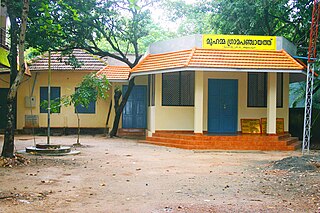Related Research Articles

The Right to Information (RTI) is an act of the Parliament of India which sets out the rules and procedures regarding citizens' right to access information. It replaced the former Freedom of Information Act, 2002. Under the provisions of RTI Act, any citizen of India may request information from a "public authority" which is required to reply expeditiously or within thirty days. In case of the matter involving a petitioner's life and liberty, the information has to be provided within 48 hours. The Act also requires every public authority to computerise their records for wide dissemination and to proactively publish certain categories of information so that the citizens need minimum recourse to request information formally.
This article describes the various laws related to non profit organisations in India. A non profit organisation can be registered in India as a Society, under the Registrar of Societies or as a Trust, by making a Trust deed, or as a Section 8 Company, under the Companies Act, 2013.

The Institute of Actuaries of India is the sole national apex body for actuaries in India. It was formed in September 1944 by the conversion of the Actuarial Society of India into a body corporate by virtue of the Actuaries Act, 2006. It is under the ownership of Ministry of Finance, Government of India.
A statutory corporation is a government entity created as a statutory body by statute. Their precise nature varies by jurisdiction, but they are corporations owned by a government or controlled by national or sub-national government to the extent provided for in the creating legislation.

The Ministry of Tribal Affairs (MOTA) is an Indian Government ministry charged with overall development of Scheduled Tribe communities of India by providing them education, scholarships, grants to create more health infrastructure in tribal communities, preservation of Tribal Culture & languages and direct cash transfer schemes to economically backward tribal families.

Child Rights and You (CRY) is an Indian non-governmental organization (NGO) that works towards ensuring children's rights.
A statutory body or statutory authority is a body set up by law (statute) that is authorised to implement certain legislation on behalf of the relevant country or state, sometimes by being empowered or delegated to set rules in their field. They are typically found in countries which are governed by a British style of parliamentary democracy such as the United Kingdom and the Commonwealth countries like Australia, Canada, India and New Zealand. They are also found in Israel and elsewhere. Statutory authorities may also be statutory corporations, if created as a body corporate.
Indian non-governmental organisations (NGOs) can be set up under various Indian laws.

The Ministry of Micro, Small and Medium Enterprises is the ministry in the Government of India. It is the apex executive body for the formulation and administration of rules, regulations and laws relating to micro, small and medium enterprises in India. The Minister of Micro, Small and Medium Enterprises is Jitan Ram Manjhi.

In India, the Urban Local Bodies (UBL), also called municipalities, are self-government institutions responsible for the administration of cities, towns, and transitional areas within a state or Union Territory. The 74th amendment to the Constitution of India in 1992 provided constitutional framework for the establishment of Urban Local Bodies.
Local government in India is governmental jurisdiction below the level of the state. Local self-government means that residents in towns, villages and rural settlements are the people who elect local councils and their heads authorising them to solve the important issues. India is a federal republic with three spheres of government: union, state and local. The 73rd and 74th constitutional amendments give recognition and protection to local governments and in addition each state has its own local government legislation. Since 1992, local government in India takes place in two very distinct forms. Urban localities, covered in the 74th amendment to the Constitution, have Municipality but derive their powers from the individual state governments, while the powers of rural localities have been formalized under the panchayati raj system, under the 73rd amendment to the Constitution.

The Bureau of Indian Standards (BIS) is the National Standards Body of India under Department of Consumer affairs, Ministry of Consumer Affairs, Food & Public Distribution, Government of India. It is established by the Bureau of Indian Standards Act, 2016 which came into effect on 12 October 2017. The Minister in charge of the Ministry or Department having administrative control of the BIS is the ex-officio President of the BIS. BIS has 500 plus scientific officers working as Certification Officers, Member secretaries of technical committees and lab OIC's.
The Societies Registration Act, 1860 is a legislation in British India which allows the registration of entities generally involved in the benefit of society – education, health, employment etc.
All India Financial Institutions (AIFI) is a group composed of financial regulatory bodies that play a pivotal role in the financial markets. Also known as "financial instruments", the financial institutions assist in the proper allocation of resources, sourcing from businesses that have a surplus and distributing to others who have deficits - this also assists with ensuring the continued circulation of money in the economy. Possibly of greatest significance, the financial institutions act as an intermediary between borrowers and final lenders, providing safety and liquidity. This process subsequently ensures earnings on the investments and savings involved. In Post-Independence India, people were encouraged to increase savings, a tactic intended to provide funds for investment by the Indian government. However, there was a huge gap between the supply of savings and demand for the investment opportunities in the country.
The Jan Lokpal Bill, also referred to as the Citizen's Ombudsman Bill, was a bill drawn up by civil society activists in India seeking the appointment of a Jan Lokpal, an independent body to investigate corruption cases and complete the investigation within a year for envisaging trial in the case getting completed within one year.

Indian Institute of Information Technology Vadodara (IIITV) is a higher-education institute located in Gandhinagar, Gujarat, India. It is one of the Indian Institutes of Information Technology established by the Ministry of Education, Government of India under the Indian Institutes of Information Technology Act, 2017. The act provides the institute the status of Institute of National Importance.

The Panchayat raj is a political system, originating from the Indian subcontinent, found mainly in India, Pakistan, Bangladesh, Sri Lanka, and Nepal. It is one of the oldest systems of local government in the Indian subcontinent, and historical mentions date to around 250 CE. The word raj means 'rule' and panchayat means 'assembly' (ayat) of 'five' (panch). Traditionally, panchayats consisted of wise and respected elders chosen and accepted by the local community. These assemblies settled disputes between both individuals and villages. However, there were varying forms of such assemblies.

The National Institute for Safety and Health at Work is an autonomous agency of the Government of Spain. The INSST is considered a technical-scientific agency entrusted with the task of analyze and research on safety and health conditions at work, as well of promoting and supporting the improvement of them, in order to achieve a decrease in occupational hazards, work accidents and occupational diseases.

The Jammu and Kashmir Public Safety Act, 1978 (PSA) is a preventive detention law under which a person is taken into custody to prevent them from acting harmfully against "the security of the state or the maintenance of the public order" in the Indian state of Jammu and Kashmir. Whereas PSA applies only to Jammu and Kashmir, it is very similar to the National Security Act that is used by the central and other state governments of India for preventive detention.